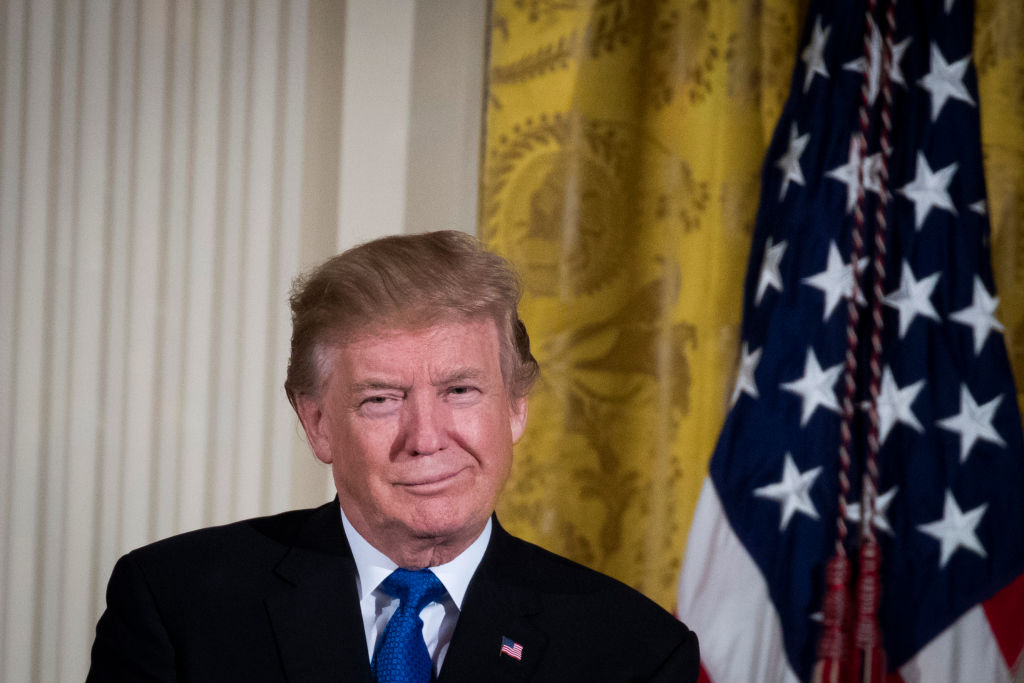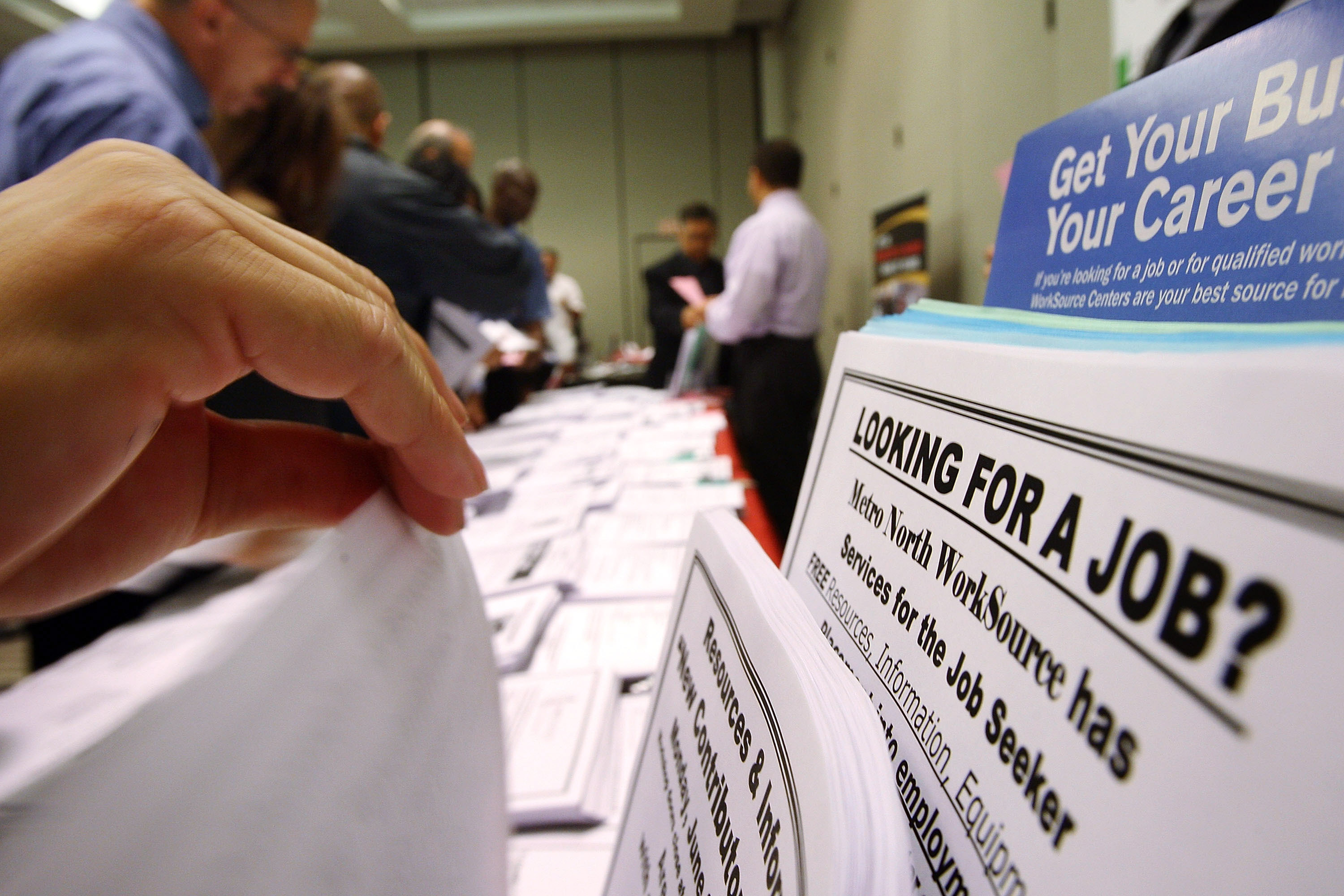The daily business briefing: April 6, 2018
Trump doubles down in trade war with China, the economy added far fewer jobs than expected in March, and more


- 1. Trump considers tariffs on another $100 billion in Chinese imports
- 2. Economy adds 103,000 jobs in March, far fewer than expected
- 3. Sandberg says users would have to pay to opt out of all Facebook ads
- 4. Trade deficit rises to highest in 9 years
- 5. China's Didi Chuxing to challenge Uber in Mexico
A free daily email with the biggest news stories of the day – and the best features from TheWeek.com
You are now subscribed
Your newsletter sign-up was successful
1. Trump considers tariffs on another $100 billion in Chinese imports

President Trump on Thursday ordered the U.S. trade representative to look into imposing tariffs on another $100 billion in Chinese imports. Trump said he made the decision in response to China's "unfair retaliation" against new import duties imposed by his administration. "Rather than remedy its misconduct, China has chosen to harm our farmers and manufacturers," Trump said. A Chinese official said Beijing would "definitely fight back." Futures for the main U.S. stock indexes dropped by about 1 percent early Friday as the trade war intensified. China on Wednesday announced it would raise tariffs to up to 25 percent on $50 billion worth of U.S. products, including soybeans, after the U.S. unveiled similar levies on $50 billion worth of Chinese goods.
2. Economy adds 103,000 jobs in March, far fewer than expected

The Labor Department reported Friday that U.S. employers added 103,000 jobs in March, well below the 193,000 forecast and the smallest gain since last fall. January's gains were adjusted down to 176,000 from 239,000, while the February increase was bumped up from 313,000 to 326,000. The labor market remained tight, with the unemployment rate unchanged at 4.1 percent, the lowest level in 17 years. Hourly wages rose by 0.3 percent to $26.82. The monthly jobs report further clouded the economic picture after a flurry of economic signals, with consumer sentiment at a 14-year high but investor concern over a trade war between the U.S. and China rising. The Federal Reserve watches the jobs figures closely to determine its next moves on interest rates.
The Week
Escape your echo chamber. Get the facts behind the news, plus analysis from multiple perspectives.

Sign up for The Week's Free Newsletters
From our morning news briefing to a weekly Good News Newsletter, get the best of The Week delivered directly to your inbox.
From our morning news briefing to a weekly Good News Newsletter, get the best of The Week delivered directly to your inbox.
3. Sandberg says users would have to pay to opt out of all Facebook ads

Sheryl Sandberg, the chief operating officer of Facebook, told NBC News the company would have to charge users if they want to opt out of data-driven advertising on the social media platform. During an interview with Today show co-anchor Savannah Guthrie, Sandberg said Facebook does not sell or give away information on users, but "our service depends on your data." On Wednesday, Facebook revealed that up to 87 million users had their personal information improperly shared with the data analysis firm Cambridge Analytica before the 2016 presidential election. "It is definitely the case in 2016 that we were behind and we didn't understand that kind of election interference," she said. "We thought that the data had been deleted, and you're right, we should have checked."
4. Trade deficit rises to highest in 9 years
The U.S. trade deficit rose to $57.6 billion in February, the highest monthly gap in more than nine years, according to figures released Thursday by the Commerce Department. Imports and exports alike rose to record highs due to strong demand in the U.S. and abroad. The news came at a time of high trade tensions, with the U.S. and China hitting each other with tariffs as President Trump seeks to punish China and other countries that sell far more than they buy in trade with America. Economists, however, warn that tariffs won't reverse trade deficits. "Tariffs may sound like a good way to change the pattern of trade, but they tend to raise prices rather than modify the trade fundamentals," said Joel Naroff, chief economist at Naroff Economic Advisors in Pennsylvania.
A free daily email with the biggest news stories of the day – and the best features from TheWeek.com
5. China's Didi Chuxing to challenge Uber in Mexico

Chinese ride-hailing company Didi Chuxing launched a website advertising to drivers and passengers in Mexico ahead of its first foray into a market outside Asia. The company says on its website that it will start operating in Mexico "very soon." The move will set off a potentially expensive battle in the country with U.S. rival Uber, which had 87 percent of the Mexican market last August. Uber has 7 million users in dozens of cities. Mexico is considered fertile territory for ride-hailing services, due to its congested cities, underdeveloped public transit, and rising smartphone use. Didi is recruiting drivers by promising it won't take a cut from fares until June 17.
Harold Maass is a contributing editor at The Week. He has been writing for The Week since the 2001 debut of the U.S. print edition and served as editor of TheWeek.com when it launched in 2008. Harold started his career as a newspaper reporter in South Florida and Haiti. He has previously worked for a variety of news outlets, including The Miami Herald, ABC News and Fox News, and for several years wrote a daily roundup of financial news for The Week and Yahoo Finance.
-
 Local elections 2026: where are they and who is expected to win?
Local elections 2026: where are they and who is expected to win?The Explainer Labour is braced for heavy losses and U-turn on postponing some council elections hasn’t helped the party’s prospects
-
 6 of the world’s most accessible destinations
6 of the world’s most accessible destinationsThe Week Recommends Experience all of Berlin, Singapore and Sydney
-
 How the FCC’s ‘equal time’ rule works
How the FCC’s ‘equal time’ rule worksIn the Spotlight The law is at the heart of the Colbert-CBS conflict
-
 Epstein files topple law CEO, roil UK government
Epstein files topple law CEO, roil UK governmentSpeed Read Peter Mandelson, Britain’s former ambassador to the US, is caught up in the scandal
-
 Iran and US prepare to meet after skirmishes
Iran and US prepare to meet after skirmishesSpeed Read The incident comes amid heightened tensions in the Middle East
-
 Israel retrieves final hostage’s body from Gaza
Israel retrieves final hostage’s body from GazaSpeed Read The 24-year-old police officer was killed during the initial Hamas attack
-
 China’s Xi targets top general in growing purge
China’s Xi targets top general in growing purgeSpeed Read Zhang Youxia is being investigated over ‘grave violations’ of the law
-
 Panama and Canada are negotiating over a crucial copper mine
Panama and Canada are negotiating over a crucial copper mineIn the Spotlight Panama is set to make a final decision on the mine this summer
-
 Why Greenland’s natural resources are nearly impossible to mine
Why Greenland’s natural resources are nearly impossible to mineThe Explainer The country’s natural landscape makes the task extremely difficult
-
 Iran cuts internet as protests escalate
Iran cuts internet as protests escalateSpeed Reada Government buildings across the country have been set on fire
-
 US nabs ‘shadow’ tanker claimed by Russia
US nabs ‘shadow’ tanker claimed by RussiaSpeed Read The ship was one of two vessels seized by the US military
